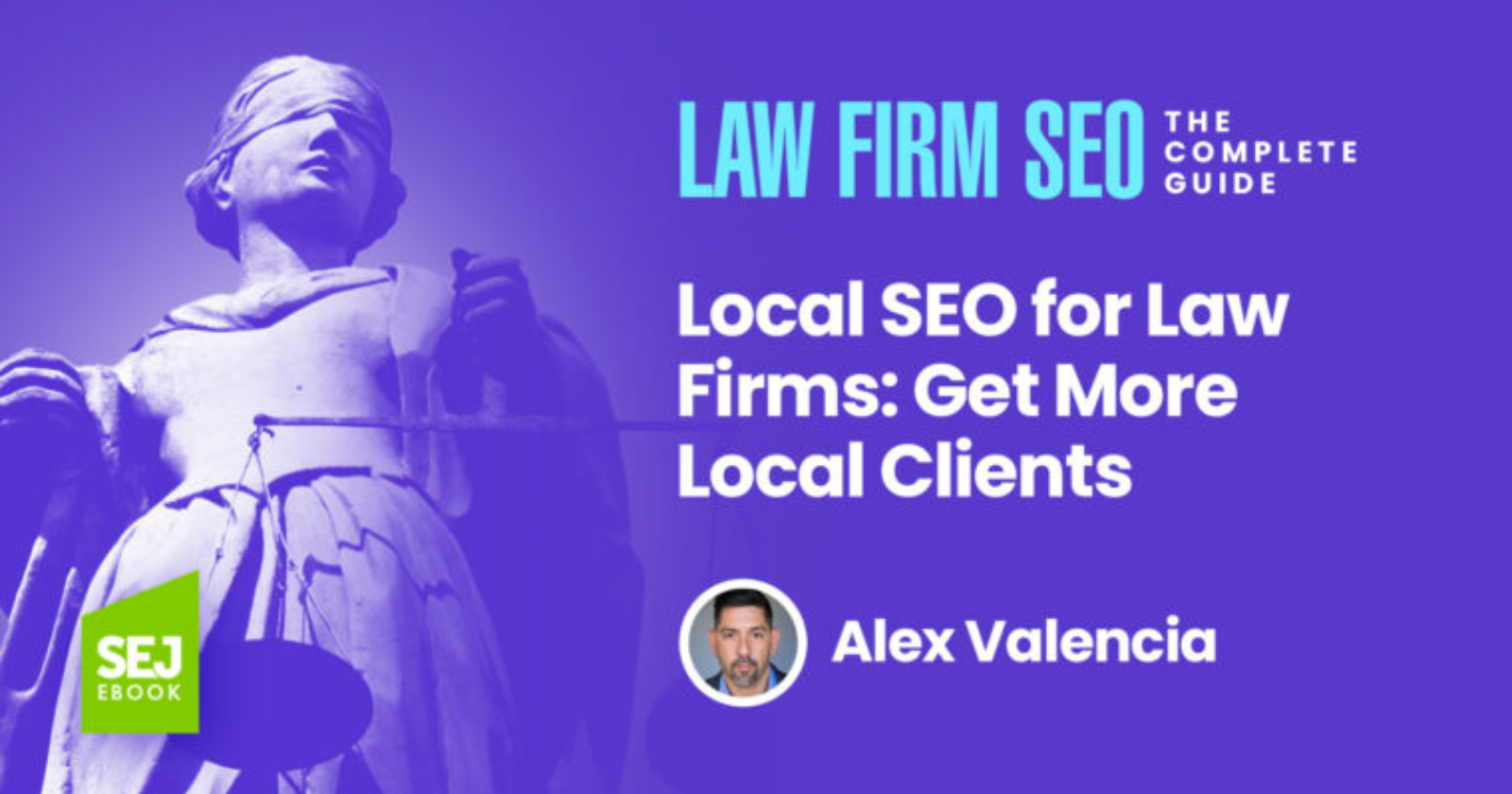SEO
Local SEO For Law Firms: Get More Local Clients

Law is a competitive industry, especially when it comes to SEO. But if you’re just focusing on the big keywords in search of traffic, you could be wasting a lot of effort.
A location binds most searches for legal questions or services. You want to show up in the most relevant results, targeting local searchers.
So, to rank higher in Google and for other top-ranking search engines, you should focus on local search engine optimization (SEO).
Google’s Local Pack has become more competitive, showing fewer results. While local SEO and organic SEO are different strategies, you need to approach your organic SEO with a local mindset.
This article will show you how to optimize your law firm’s website and business listings to rank better for local SEO.
What Is Local SEO For Law Firms?
Local SEO is a type of search engine optimization that targets local SERP features like the Local Pack. These features appear at the top of the page, often alongside a map, when Google deems a search query to have location-based intent.
Organic search focuses on the results below ads and SERP features. But to assist with your local SEO efforts, it’s also essential to bring a local mindset to your organic results.
If someone is looking for a service in their local area or uses localized search terms like [best lawyer in New York], they’re likely to see Local Pack results.
Screenshot from Google search for [best lawyer in new york], August 2022
In the case of lawyers, they’re also likely to see ads with “Google Screened” results for nearby providers.
Google Screened results are ads for service providers that have been through additional screening by Google. The verticals that use this feature include child care, finance, health, and law. You’ll notice that the Google Screened results focus on nearby businesses and display some of the features of the Local Pack, such as reviews and hours. They’re also at the very top of the page. If you want that coveted spot, you’ll need to get screened and develop a local advertising strategy.
Local SEO is essential for law firms because most law firms serve clients in a specific geographic area. Unless you service clients nationally, you’ll likely only want leads from people within your county, city, or state.
Additionally, it’s less competitive to try and rank for localized keywords than for broad keywords.
Fewer people may be searching for a [criminal lawyer in Dallas]. Still, there will also be fewer law firms trying to rank for that term compared to the [best criminal lawyer] period.
Key Components Of Local SEO For Law Firms
If you’re ready to invest in one of the most effective marketing methods for law firms, it’s time to get into local SEO.
Below, we’ve outlined the main components of local SEO for law firms and how to implement them for your site so you can start attracting more local clients.
Website Optimization
The first component of local SEO for law firms is website optimization, as you’ll need a fast, functional, and SEO-friendly website to attract organic traffic.
If you already have a website, this means following on-page and technical SEO best practices to address any on-site issues.
This could include fixing broken links, optimizing your website’s load speed, using your target keywords through page titles and content, and laying out a user-friendly site structure.
If you are building a new site, ensure your web developer understands SEO and can design a site optimized for search engines and people.
If your website loads quickly, is easy to navigate, and can be indexed by search engines, you’ll have a better chance of ranking in the local search results.
Mobile Experience
51% of website visits in the U.S. come from mobile devices. This means people are using smartphones and tablets to search for goods and services and are then browsing websites on the go.
As a website owner, you’ll want a mobile-friendly site so prospective clients can navigate your site even on a small screen.
To do this, you should create a mobile-friendly version of your website with clear text, fast-loading images, and clear call-to-action buttons.
Focusing on mobile experience is essential not only because mobile friendliness is an important ranking factor but also because it will keep visitors on your website for longer.
Content Creation
Your website content tells visitors what you do, how you can help them, and how they can get in contact with you.
It also works to attract organic visitors when you use localized keywords throughout the titles, meta descriptions, and body text of your webpages.
In conducting keyword research for your law firm content strategy, use keyword research tools like Semrush, Google Search Console, or Soovle. They can help you find relevant terms to the area you serve and your services and inspire the content you should create.
For example, if you provide criminal law services in Los Angeles, you might want to target keywords like [Los Angeles criminal lawyer] or [criminal law attorneys in Los Angeles].
You can then use these terms on a “Criminal Law” service page or the homepage of your site.
Beyond that, you can publish informative articles that attract prospective clients.
With blog posts like “What The New DUI Laws Mean For Los Angeles Residents” or “What Do I Do If I Get Arrested In Los Angeles?” you can work to attract prospective clients to your firm.
This is where a local SEO strategy shines in organic results. People searching for information aren’t likely to want Local Pack results so that they may scroll to the articles. You still want to let them know your answers are relevant to their location when they do.
Once you have found the keywords you want to target, you should write informative content that speaks to your client’s interests. Then, naturally, use your target and related keywords throughout the page to rank for these terms in local search.
But remember not to overload your content with keywords. So much so that it takes away from the intention of your content.
Google Business Profile
How can I get my law firm to rank higher on Google Maps or local maps apps?
Law firms often struggle to rank well on Google Maps because they lack a strong presence in their city’s area code.
Unfortunately, this means fewer clients will see them, and they won’t show up in search results.
And you may already realize that Google’s Local Pack algorithm affects your local SEO rankings. The Local Pack algorithm gives consumers high-quality information from nearby locations. As a result, you might see fewer local listings appear in organic search results.
To gain visibility on search engine results pages (SERPs) and Google Maps, start by taking advantage of your Google Business Profile (GBP). A GBP helps businesses connect with customers across all devices, whether you want to reach new audiences or improve conversions.
Getting started with Google Business Profile is free, and there are multiple fields where you can include your business hours, services, address, phone number, website URL, and more.
Start by adding photos and details about your practice, then add information about your staff and services. Finally, let Google know where your office is located.
Once complete, check back frequently to ensure your listing stays accurate. A GBP is essentially an online directory and one-stop shop for prospective customers, so it’s crucial to update it consistently.
A GBP also allows you to accumulate reviews from past clients, boosting your law firm’s reputation and local rankings.
Reputation & Reviews
Positive client reviews can work wonders to increase your law firm’s authority, online reputation, and search engine rankings.
If prospective clients search for a lawyer and see that your firm has the most positive reviews, they may be inclined to choose you over the competition.
You can ask clients to leave reviews on your Google Business Profile, Facebook, and other directory listings.
Having a slew of positive reviews can set your law firm apart while indicating to Google that your law firm is legit.
Regarding reviews and online reputation management, it’s crucial to have a strategy to monitor and respond to online reviews promptly.
Online reviews matter to consumers and are a significant indicator of if they’ll choose your business.
A recent study shows that 53% of consumers expect a business to respond to a negative review within seven days. But don’t leave out positive reviews. It’s essential to respond to those as well.
If consumers see that your firm responds to reviews, it can show you provide good customer service and that your customer’s impression of your business matters to you.
Link Building & Citations
The last component of local SEO for law firms is link building, which involves attracting links from other sites back to your website.
Since a link from another site (a “backlink”) is essentially a vote of confidence from that site that your law firm is reputable and a good source of information. So attracting a variety of high-quality links can improve your local rankings.
The key here is to attract links from reputable, industry-related sites. One way to do this is by submitting your business information to directories.
Or you can submit guest posts to websites and landing interviews in industry publications, creating high-value content that naturally attracts links.
In addition, marketing your content, ebooks, and PDFs to outside blogs can be a beneficial strategy.
This is just the tip of the iceberg regarding link building, but it’s worth trying out various strategies instead of buying cheap links.
Remember, focus on quality over quantity. The best links will help you boost your local rankings and generate more referral traffic.
Your Law Firm Needs Local SEO
If you haven’t already done so, now would be a great time to optimize your website and listings for local search. This will give potential clients a better idea of where you practice law and allow you to attract new clients from the community you serve.
Local SEO has become increasingly important for law firms looking to grow their practice.
Therefore, it only makes sense that firms should take advantage of the same tools used by other businesses to build their online presence and authority.
Optimizing your website presence will increase traffic from local searches and help your firm rank higher on SERPs.
Featured Image: Paulo Bobita/Search Engine Journal
SEO
Executive Director Of WordPress Resigns

Josepha Haden Chomphosy, Executive Director of the WordPress Project, officially announced her resignation, ending a nine-year tenure. This comes just two weeks after Matt Mullenweg launched a controversial campaign against a managed WordPress host, which responded by filing a federal lawsuit against him and Automattic.
She posted an upbeat notice on her personal blog, reaffirming her belief in the open source community as positive economic force as well as the importance of strong opinions that are “loosely held.”
She wrote:
“This week marks my last as the Executive Director of the WordPress project. My time with WordPress has transformed me, both as a leader and an advocate. There’s still more to do in our shared quest to secure a self-sustaining future of the open source project that we all love, and my belief in our global community of contributors remains unchanged.
…I still believe that open source is an idea that can transform generations. I believe in the power of a good-hearted group of people. I believe in the importance of strong opinions, loosely held. And I believe the world will always need the more equitable opportunities that well-maintained open source can provide: access to knowledge and learning, easy-to-join peer and business networks, the amplification of unheard voices, and a chance to tap into economic opportunity for those who weren’t born into it.”
Turmoil At WordPress
The resignation comes amidst the backdrop of a conflict between WordPress co-founder Matt Mullenweg and the managed WordPress web host WP Engine, which has brought unprecedented turmoil within the WordPress community, including a federal lawsuit filed by WP Engine accusing Mullenweg of attempted extortion.
Resignation News Was Leaked
The news about the resignation was leaked on October 2nd by the founder of the WordPress news site WP Tavern (now owned by Matt Mullenweg), who tweeted that he had spoken with Josepha that evening, who announced her resignation.
He posted:
“I spoke with Josepha tonight. I can confirm that she’s no longer at Automattic.
She’s working on a statement for the community. She’s in good spirits despite the turmoil.”
Screenshot Of Deleted Tweet
Josepha tweeted the following response the next day:
“Ok, this is not how I expected that news to come to y’all. I apologize that this is the first many of you heard of it. Please don’t speculate about anything.”
Rocky Period For WordPress
While her resignation was somewhat of an open secret it’s still a significant event because of recent events at WordPress, including the resignations of 8.4% of Automattic employees as a result of an offer of a generous severance package to all employees who no longer wished to work there.
Read the official announcement:
Featured Image by Shutterstock/Wirestock Creators
SEO
8% Of Automattic Employees Choose To Resign

WordPress co-founder and Automattic CEO announced today that he offered Automattic employees the chance to resign with a severance pay and a total of 8.4 percent. Mullenweg offered $30,000 or six months of salary, whichever one is higher, with a total of 159 people taking his offer.
Reactions Of Automattic Employees
Given the recent controversies created by Mullenweg, one might be tempted to view the walkout as a vote of no-confidence in Mullenweg. But that would be a mistake because some of the employees announcing their resignations either praised Mullenweg or simply announced their resignation while many others tweeted how happy they are to stay at Automattic.
One former employee tweeted that he was sad about recent developments but also praised Mullenweg and Automattic as an employer.
He shared:
“Today was my last day at Automattic. I spent the last 2 years building large scale ML and generative AI infra and products, and a lot of time on robotics at night and on weekends.
I’m going to spend the next month taking a break, getting married, and visiting family in Australia.
I have some really fun ideas of things to build that I’ve been storing up for a while. Now I get to build them. Get in touch if you’d like to build AI products together.”
Another former employee, Naoko Takano, is a 14 year employee, an organizer of WordCamp conferences in Asia, a full-time WordPress contributor and Open Source Project Manager at Automattic announced on X (formerly Twitter) that today was her last day at Automattic with no additional comment.
She tweeted:
“Today was my last day at Automattic.
I’m actively exploring new career opportunities. If you know of any positions that align with my skills and experience!”
Naoko’s role at at WordPress was working with the global WordPress community to improve contributor experiences through the Five for the Future and Mentorship programs. Five for the Future is an important WordPress program that encourages organizations to donate 5% of their resources back into WordPress. Five for the Future is one of the issues Mullenweg had against WP Engine, asserting that they didn’t donate enough back into the community.
Mullenweg himself was bittersweet to see those employees go, writing in a blog post:
“It was an emotional roller coaster of a week. The day you hire someone you aren’t expecting them to resign or be fired, you’re hoping for a long and mutually beneficial relationship. Every resignation stings a bit.
However now, I feel much lighter. I’m grateful and thankful for all the people who took the offer, and even more excited to work with those who turned down $126M to stay. As the kids say, LFG!”
Read the entire announcement on Mullenweg’s blog:
Featured Image by Shutterstock/sdx15
SEO
YouTube Extends Shorts To 3 Minutes, Adds New Features

YouTube expands Shorts to 3 minutes, adds templates, AI tools, and the option to show fewer Shorts on the homepage.
- YouTube Shorts will allow 3-minute videos.
- New features include templates, enhanced remixing, and AI-generated video backgrounds.
- YouTube is adding a Shorts trends page and comment previews.
-

 WORDPRESS3 days ago
WORDPRESS3 days agoWordPress biz Automattic details WP Engine deal demands • The Register
-
SEARCHENGINES5 days ago
Daily Search Forum Recap: September 30, 2024
-

 SEO7 days ago
SEO7 days agoYoast Co-Founder Suggests A WordPress Contributor Board
-

 SEARCHENGINES6 days ago
SEARCHENGINES6 days agoGoogle Volatility With Gains & Losses, Updated Web Spam Policies, Cache Gone & More Search News
-

 SEO7 days ago
SEO7 days ago6 Things You Can Do to Compete With Big Sites
-
SEARCHENGINES4 days ago
Daily Search Forum Recap: October 1, 2024
-

 SEO6 days ago
SEO6 days agoAn In-Depth Guide For Businesses
-

 AFFILIATE MARKETING5 days ago
AFFILIATE MARKETING5 days agoNvidia CEO Jensen Huang Praises Nuclear Energy to Power AI















You must be logged in to post a comment Login